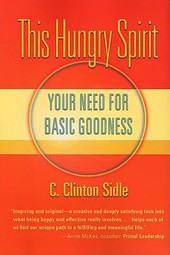Clint Sidle discusses his new book on our need to do good
By Brandon Ray
The Johnson School's Clint Sidle recently penned "This Hungry Spirit: Your Need for Basic Goodness" (Larson Publications), in which he lays out his ideas of basic goodness and how they relate to authenticity, leadership and success. His basic premise is that the better you feel about yourself, the more likely you are to be not only successful, but also wanting to do good in the world.
"This is a leadership book, but it's also a happiness book and a self-help book, and I am not aware of another book that combines these three things," says Sidle, director of the Roy H. Park Leadership Fellows Program at the Johnson School.
The following is an excerpt of an interview with Sidle, recently published in Cornell Business, the Johnson School's student newspaper.
What inspired you to write this book now?
Originally, it was going to be just about my own journey, but then my work here at the Johnson and my own personal journey merged.
This is about increasing your own freedom, so to speak, by expanding your awareness of the choices that you have about life, work, family and success.
Where did the title come from?
The idea is that we all have this "hungry spirit" -- a longing, yearning, striving, achieving, driving energy. It can take the form of a life-long goal, or it can be as subtle as being uncomfortable when we're sitting alone for a moment in a reflective space. But it's always there, and as we grow up it is shaped by our socialization process -- our parents, our media, our friends. … We often then live out our lives living up to the expectations of others as opposed to something that is more authentically you. When we do that, it can show up as problems in relationships and in professional life.
Can you talk about this concept of "basic goodness" that you introduce in "This Hungry Spirit"?
What I have found is that when we are self-absorbed, we're worried about careers, ourselves, protecting our image, protecting our success. We are more absorbed in fear. However, when you shift your focus from self-absorption to "other" -- meaning helping and serving other people, greater causes and greater purposes -- it creates a "basic goodness" and a feeling of well-being that translates into success. It is that, as I say in the book, what makes you happy also makes you successful.
So what advice does this book give to business school students and young leaders?
This is a handbook. There are lots of exercises to peel back the old mental models that you adopted or inherited from your old socialization process, and the introduction of new mental models that can guide you to the more authentic you. There's a section in the book called "Follow Your Bliss," that's really about finding the right career path for you.
In whatever job you take, play to your strengths, and serve your purpose. When you do that, you're coming from a place of enjoyment and inspiration. You'll create more opportunities for yourself, and the next opportunity is just to move to the one that seems closest to who you are. Shape the job to you, and not the other way around, until you find what you love. It's a process, a journey.
Brandon Ray, Johnson School '10, is co-editor-in-chief of Cornell Business.
Media Contact
Get Cornell news delivered right to your inbox.
Subscribe
